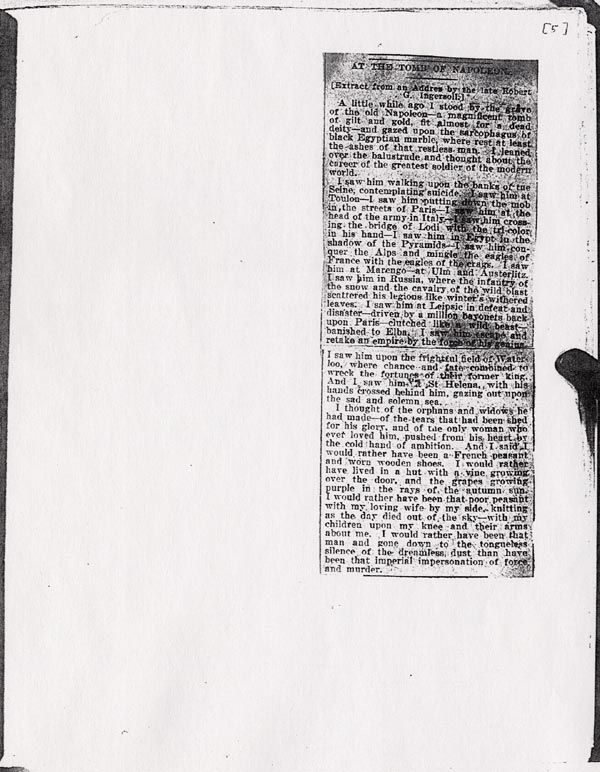
AT THE TOMB OF NAPOLEON.
(Extract from an Addres by the late Robert G. Ingersoll.)
A little while ago I stood by the grave
of the old Napoleon - a magnificent tomb
of gilt and gold, fit almost for a dead
deity - and gazed upon the sarcophagus of
black Egyptian marble, where rest at least
the ashes of that restless man. I leaned
over the balustrade and thought about the
career of the greatest soldier of the modern
world.
I saw him walking upon the banks of the
Seine; contemplating suicide. I saw him at
Toulon - I saw him putting down the mob
in the streets of Paris - I saw him at the
head of the army in Italy - I saw him cross-
ing the bridge of Lodi with the tri-color
in his hand - I saw him in Egypt in the
shadow of the Pyramids - I saw him con-
quer the Alps and mingle the eagles of
France with the eagles of the crags. I saw
him at Marengo - at Ulm and Austerlitz.
I saw him in Russia, where the infantry of
the snow and the cavalry of the wild blast
scattered his legions like winter's withered
leaves. I saw him at Leipsic in defeat and
disaster - driven by a million bayonets back
upon Paris - clutched like a wild beast -
banished to Elba. I saw him escape and
retake an empire by the force of his genius.
I saw him upon the frightful field of Water-
loo, where chance and fate combined to
wreck the fortunes of their former king.
And I saw him at St Helena, with his
hands crossed behind him, gazing out upon
the sad and solemn sea.
I thought of the orphans and widows he
had made - of the tears that had been shed
for his glory, and of the only woman who
ever loved him, pushed from his heart by
the cold hand of ambition. And I said I
would rather have been a French peasant
and worn wooden shoes. I would rather
have lived in a hut with a vine growing
over the door, and the grapes growing
purple in the rays of the autum sun.
I would rather have been that poor peasant
with my loving wife by my side, knitting
as the day died out of the sky - with my
children upon my knee and their arms
about me. I would rather have been that
man and gone down to the tongueless
silence of the dreamless dust than have
been that imperial impersonation of force
and murder.



